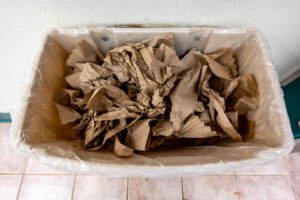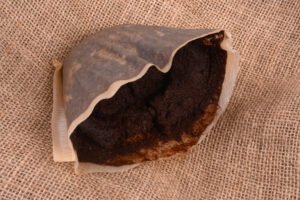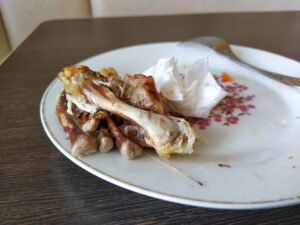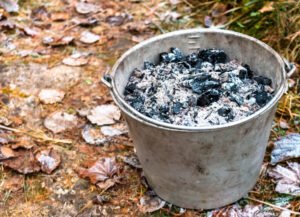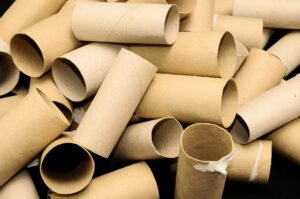Parchment paper is a must-have item in every kitchen. But have you ever wondered about using it outside the kitchen? Can you do something with the used parchment paper for your plants? Can you compost it? Let’s find out!
Key Takeaways
- You can compost parchment paper as long as it is unwaxed, unbleached, and free from food residues. It is a good carbon supplier and acts as a brown material for compost.
- Clean and unwaxed parchment paper can be composted via regular hot composting and Bokashi composting.
- Shred the paper into small pieces before adding it to the compost pile, and add water to expedite the process.
- Adding brown parchment paper to the compost will improve its structure, aeration, and moisture retention properties.
What is Parchment Paper?

Parchment paper or baking paper is a multipurpose paper used in the kitchen for its non-stick and heat-resistant properties. It is used in cooking and for various purposes like lining baking trays, wrapping food and baked goods, making piping bags, etc.
Parchment paper is made by running wood pulp from fir trees, cotton, or flax, through a bath of sulfuric acid or zinc chloride. It is coated with silicone to give it a non-stick and grease-resistant surface.
Types of Parchment Paper
Parchment paper is of two kinds, namely bleached parchment paper and unbleached parchment paper.
- Bleached parchment paper: It is white and is chemically treated with chlorine to remove its natural brown color. It’s cheaper but unsuitable for composting.
- Unbleached parchment paper: It is brown, harmless, and not treated with chlorine.

White parchment paper releases dioxins due to the presence of chlorine, which prevents decomposition. This makes it unfit for composting as well as poses health-related risks. Therefore, you should only compost brown parchment paper.
How to Compost Parchment Paper?

Parchment paper is a good source of Carbon and is, therefore, can be used as a brown material for the compost pile. If you have been composting before, simply shred the parchment paper and add it to your compost along with other brown stuff.
If you’re starting a compost pile from scratch to compost the parchment paper, follow these steps:
Step 1: Shred the Parchment Paper
The first and foremost step is to cut the paper into small pieces. Shredding the paper will help accelerate the decomposition process.
Step 2: Add Brown Layer to Compost Bin
Brown layer is the layer of carbon-rich materials. These include yard waste, cardboard, pine needles, sawdust, dead plant clippings, mulch, paper, etc.
Step 3: Add Shredded Parchment Paper
Add shredded paper to the pile along with brown material.
Or, you can add shredded parchment paper without other browns if you just want to compost the baking paper alone.
You can cut the paper and soak it in water before adding it to the pile. This will aid the breakdown.
Step 4: Add Green Materials
Add the Nitrogen-rich green layer, which includes organic material like grass clippings, vegetable and fruit peelings, eggshells, tea bags, food scraps, and hair.
Step 5: Add Water Between the Layers
Add water between the greens and browns to maintain the moisture and gear up the decomposition.
Step 6: Repeat the Layers
Add greens, browns, and compostable parchment paper, followed by sprinkling water until you’ve composted all the material.
Remember to maintain the brown to green ratio as 2:1 for proper composting.
Step 7: Turn the Pile
For compost to come into action and work fast, turning the pile is essential. But you can still avoid turning while composting through the cold composting method.
This process of composting parchment paper takes around six to eight weeks.
Other Ways of Composting Parchment Paper
You can also compost parchment paper through bokashi composting as well. The bokashi bran will decompose both waxed and non-greasy baking papers.
Or, you can add the unbleached and unwaxed baking paper to the composting tumbler and give a nice spin to all the materials. Just add it with or instead of brown material, and your compost will be prepped!
Vermicomposting is also a possible method of composting parchment paper. But it requires more monitoring as worms might not like gritting on the silicon-coated paper bits.
Benefits of Composting Parchment Paper

Composting parchment paper has a few benefits that you must know about:
- Eco-friendly: Composting unbleached parchment paper won’t cause any harm to the environment as it is chemical-free, ergo, biodegradable, and a perfect fit for the green bin or green cart.
- Source of Carbon: Parchment paper contains Carbon and can be categorized under brown material for compost.
- Improves Structure: Adding brown bakery paper will help improve the compost’s structure, ultimately ameliorating aeration and water retention.
- Reduces Landfill Waste: Using parchment paper instead of dumping it in the garbage will help utilize the carbon source, which was initially subjected to landfills.
- Decreases Carbon Footprint: Utilizing the used baking paper will contribute to minimizing carbon footprint.
You can also compost the parchment paper box, as it is usually made of cardboard. Shred it into small pieces, and add it as a brown material to your compost.
Well, this does motivate you to turn your cooking hand into a composting hand, too, right?
Disadvantages of Composting Parchment Paper
Not to forget, the parchment paper you plan to compost will first be used in the kitchen, which can cause a bit of a problem.

As such, there are certain disadvantages of composting bakery paper.
- Food Contamination: Using bakery paper in the kitchen will cause food waste residues, oils, and grease to stick to the surface. Composting this paper might contaminate the entire compost.
- Time-Consuming: Composting parchment paper is time-consuming since the silicone layer on the paper acts as a barrier for microbes, and this causes a delay in the breakdown.
- Chemical Addition: A bleached or waxed parchment paper is treated with chemicals. When composted, these chemicals might leach out into the compost and then soil, showing adverse effects.
The best way to overcome these cons is to know which types of parchment papers are unsuitable for composting.
Kinds of Parchment Papers You Should Not Compost

Here’s a list of types of bakery paper you shouldn’t compost:
- Glossy parchment paper
- Printed parchment paper
- Parchment paper with dairy, fish, or meat residues
- Fluorescent parchment paper
- Parchment paper with aluminum or metallic foil
- Waxy sheets
Precaution to Take While Composting Parchment Paper
Taking precautions while composting parchment paper can reduce the risk of a failed compost. Here are some points to consider:
- Ensure there are no food residues or grease on the bakery paper.
- Avoid adding parchment paper directly to the compost without cutting or shredding it into pieces.
- Avoid using bleached, waxed parchment paper.
- Consider using parchment paper having food or medical-grade silicone coating as this will avoid the leaching of toxic chemicals during decomposition.
Keep these points in mind, and you’re good to go!
Is Parchment Paper Same As Wax Paper?
No, the parchment paper has a silicone coating and is favored for its resistance to high temperatures, while the wax paper has a paraffin wax coating, which can melt.
Therefore, you must not use wax papers in ovens or microwaves as they can even catch fire.
While parchment paper can be used in place of wax paper, the reverse is not true.
| Parchment Paper | Wax Paper |
| Silicone coating | Paraffin wax coating |
| Resistant to heat | Easily melts |
| More expensive | Less expensive |
Can we recycle parchment paper?
No, you cannot recycle parchment paper since it has a layer of silicone which makes it difficult to be added to the blue bin or blue box. However, you can consider recycling the cardboard box which contained the parchment paper.
How long does it take to compost parchment paper?
It takes around 6-8 weeks to compost parchment paper under the right conditions.
Can we compost parchment paper with aluminum foil with it?
No, you should not compost parchment paper with aluminum foil, as aluminum is not a biodegradable material.
Are all types of parchment paper compostable?
No, it is best to avoid composting bleached parchment paper since it contains chemicals harmful to the compost.
What to do with baking sheets if we don’t have a compost bin or pile?
You can send the baking sheets or parchment paper to a commercial composting facility, where it can be composted with appropriate facilities and can be saved from entering landfills.
Are all paper products compostable?
Mostly all paper products are compostable, like cardboard, paper towel, paper bag, compostable bag, newspapers, parchment paper, tissue paper, and other related products. However, ensure that the paper product you are composting is not treated with chemicals.
Does parchment paper have a plastic coating?
No, parchment paper doesn’t have a plastic coating; it has a silicone coating.
Given these points, it is evident that you can use parchment paper for plants by composting it, with the proviso that the paper is untreated and free from chemicals.
There’s another thing everyone has in their home – newspapers. So, if you wish to compost newspapers, let us guide you!


